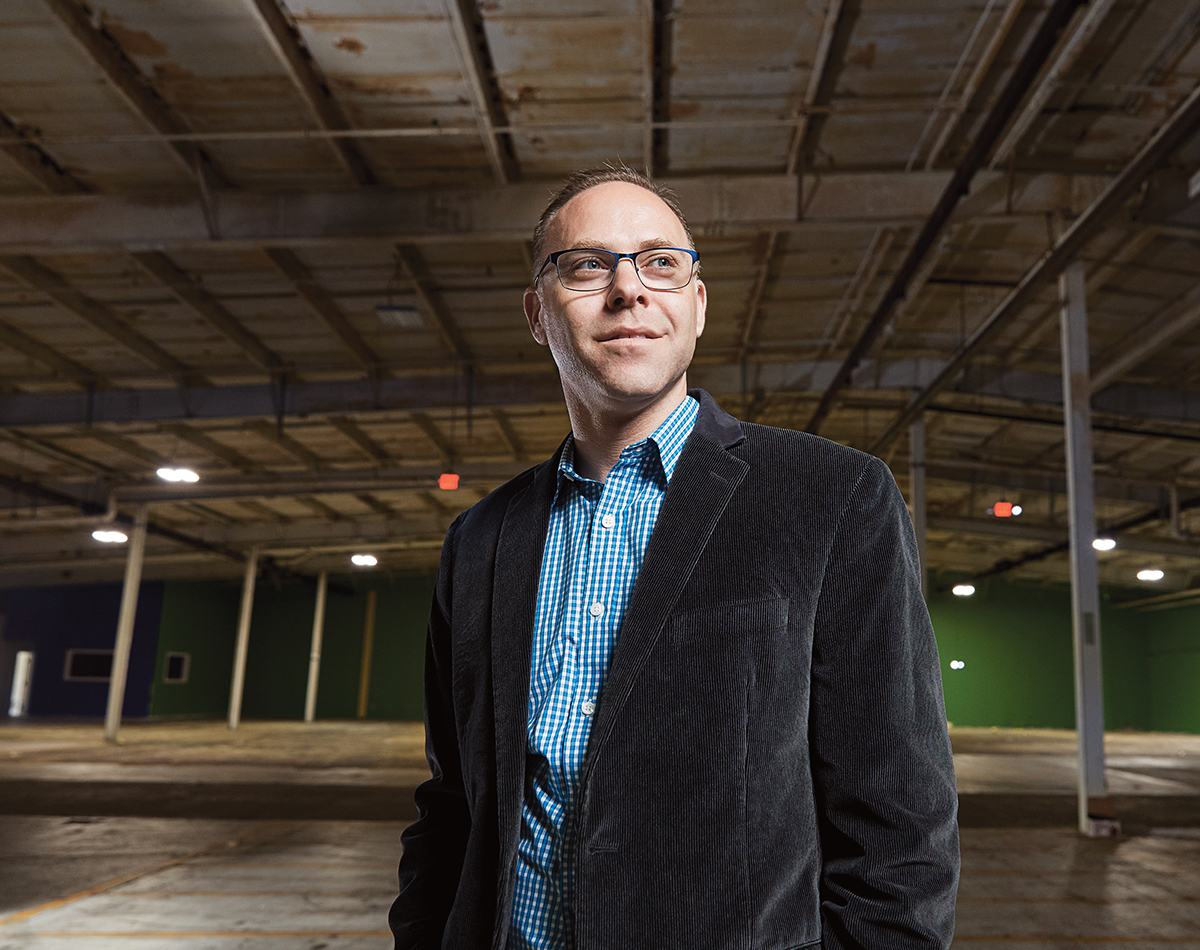Welcome to Ganjachusetts

East Coast Sour Diesel (Notes of lemon, petrol, and skunk.) / Photographs by Jim Brueckner, plants furnished by Stephen Doyle, the Thomas C. Slater Compassion Center
On a warm day in February, Kris Krane wants to show me a very large, very empty warehouse in Worcester. “There is a lot riding on this,” he says as he flips on the facility’s lights, a firmament of humming yellow fluorescents illuminating 65,000 square feet of bare concrete flooring. “We have to do this right.”
By “do this right,” Krane means fill much of the space—larger than the football field in Foxboro—with thousands upon thousands of marijuana plants. The resulting cannabis buds will be cured, trimmed, and, in some cases, processed into extracts and edibles on site. Some of the product will be sold at an attached medical marijuana dispensary named Mission, featuring iPad-equipped sample stations and other touches straight out of an Apple store. The rest will go to additional Mission locations throughout the state and eventually to other Massachusetts dispensaries. Even before the first seed has been planted, Krane is already eyeing expansion opportunities in Rhode Island, Ohio, Pennsylvania, and Arkansas; he’s also secured licenses in Illinois and Maryland.
Clean-cut, well dressed, and impeccably professional, Krane personifies the mainstreaming of marijuana. He’s spent his entire adult life advocating for the drug and has evolved from a campus activist into “the new face of the marijuana trade,” as the Globe dubbed him. He can trade war stories with stoners at the Boston Freedom Rally and then walk up the steps of the State House to expertly debate the minutia of zoning laws with local power brokers without missing a beat. “Of the five or 10 best in breed in the country,” says Allen St. Pierre, former executive director of the storied National Organization for the Reform of Marijuana Laws, “I would put Kris in there.”
For the past six years, Krane, 38, has been cultivating Boston-based 4Front Ventures, one of the country’s most successful cannabis operations and consulting companies. Most of the firm’s time is spent helping prospective medical marijuana startups navigate tricky regulations and shifting industry norms in Massachusetts and beyond. With the launch of his Mission dispensaries, though, Krane is moving directly into selling cannabis. It’s a risky bet, but if he plays his cards right, he might just turn Mission into the Dunkin’ Donuts of marijuana—and make a fortune in the process.
No longer simply a contraband drug or a fringe liberal cause, pot has become big business. The research firm Arcview Group reported that legal marijuana sales reached nearly $7 billion in North America last year, a figure that’s predicted to triple by 2021. As the first eastern state to legalize recreational use of the drug, Massachusetts is poised to command a sizable chunk of that market, and the financial upside is staggering. By some estimates, recreational marijuana may eventually inject $100 million in annual tax revenues into state coffers and churn out a new strain of influential millionaires. Powerful interests are already jockeying to control the market; it’s why the number of registered marijuana lobbyists at the State House has more than tripled in the past two years.
Despite the popular support and financial promise of recreational pot, though, political infighting and bureaucracy have bogged down efforts to get the marketplace up and running. Where there should be a gold rush, there is hesitation about being a first mover. As a result, we’re saddled with a system that incentivizes people like Krane to double down on medical marijuana, a market that’s exempt from sales tax in Massachusetts and therefore generates very little for the state.
The Worcester warehouse that Krane is guiding me through is a testament to the countless challenges threatening the industry. He has been vying to install a marijuana facility there since 2015. Between the lengthy architectural review process, the millions of dollars in construction, and the three to four months it will take before their first cannabis crop is ready to be harvested, the place won’t be open for business until early next year. Yet even then, not one gram of weed grown in that warehouse is currently earmarked for sale on the recreational market, where it could be taxed as much as 15 percent. Instead, it will all go to medical marijuana dispensaries. The reason, Krane says, is simple: “Currently, there isn’t an option for us to get recreational licenses.”
The truth is that it could still be years before an adult can walk into a dispensary and buy a bag of pot. The legislature’s Joint Committee on Marijuana Policy announced in late April that it is hoping to get a bill to Governor Charlie Baker by July, and that if all goes off without a hitch, the first recreational marijuana shops could open by July 2018. But that’s a best-case scenario and doesn’t account for a skeptical governor, who can veto whatever proposal lands on his desk, and a cast of like-minded Beacon Hill bureaucrats, NIMBY zoning boards, and angry neighborhood groups.
Krane has staked far more than his reputation on his fight for weed. This has been an all-consuming journey that has devoured gobs of investors’ dollars and years of his life. “The majority of citizens of Massachusetts supports legalization,” Krane says. “The pressure is on.”
In November voters said loud and clear that they were ready for a legal, regulated, and lucrative marijuana industry to blossom in the state. But as Krane mills around his empty warehouse, he can’t help but wonder what that will that actually look like—and when we’ll get it.

“I think it’s fair to say we are positioned to be a real player in Massachusetts and nationally,” says Kris Krane, pictured in his Worcester warehouse. / Portrait by Ken Richardson
Part of the story of how Massachusetts came to legalize recreational marijuana began 30 years ago in a New York apartment. As a kid growing up in Queens, Krane watched his father smoke joints to ease the discomfort of his hereditary emphysema before he died of the condition. Like so many individuals who’ve gone on to lead the charge on legal cannabis, Krane’s early memories of the drug formed the foundation for his life’s work.
As a teen and later as a student at American University, in Washington, DC, Krane says he “saw the student movement against the war on drugs as our antiwar movement” and began actively questioning the anti-marijuana messages learned from his grade school DARE program. He was involved with the university’s NORML chapter, then took a job with the organization after graduating in 2000. Six years later he became executive director of the nonprofit advocacy group Students for Sensible Drug Policy. By 2009, Krane, at that point a major player in the cannabis-activist community, had moved from the policy world of DC to the West Coast to help start a for-profit consulting business funded by California dispensary owners. It served as a palpable sign that the cannabis movement was turning into a big business, and folks on both sides of the marijuana debate were less than thrilled about Krane’s transition from nonprofit activist to corporate company man.
“I think he’s a nice guy,” says Kevin Sabet, a former White House drug policy senior adviser and cofounder of the major anti-legalization organization Smart Approaches to Marijuana, who regularly debated Krane. “I thought it was not surprising but unfortunate that he went into the marijuana industry. That’s how it is going. Legalization is moving from a movement of people talking about ideas toward an industry concerned with profits.”
Krane readily admits that one of the reasons he made the jump to cannabis consulting was money. With a wife and two kids, a nonprofit activist’s salary doesn’t go far. But he also saw political potential in the massive dispensaries he’d visited in California, such as Oakland’s Harborside, and he knew that his expertise would be in demand as states from Alaska to Maine began greenlighting medical marijuana programs. “I could see law enforcement and elected officials touring these stores and saying, ‘This is great,’” Krane recalls. “It became very clear to me that if you can demonstrate to people that you can distribute marijuana in a way that is safe and professional, it changes their whole perspective. I realized I could have as much impact, if not more, than I had as an activist.”

True Fruit (Sweet-tasting, with hints of honey and earth.)
After two years in California, Krane saw his consulting group fold. Looking to become a serious player in the market, he moved to Phoenix, Arizona, to get in on the green rush. With funding from John Sperling—the founder of the for-profit University of Phoenix and a drug-reform advocate who has since passed away—Krane cofounded a new consulting company called 4Front Ventures. The group brought together an eclectic cast of longtime drug-reform activists and whip-smart business experts who had worked for international brands such as Old Navy, Disney, and Credit Suisse. Together they could guide clients through every nook and cranny of the legal marijuana trade, from creating employee handbooks and manager-training programs to setting up inventory tracking systems and security plans. But rather than granting licenses to dispensaries based on merit and professional acumen, Arizona implemented a district-based lottery system to randomly select winning applicants. That left many of Krane’s Arizona clients without a foothold in the industry, so he moved the firm to an exciting new market, awash in weed and money: Massachusetts. “For a long time, the public in Massachusetts has been way out ahead of the politicians here on marijuana,” Krane says. “The public was saying they were ready for reform.”
So Krane put his hard-earned business reputation on the line, got involved with leading marijuana policy leaders, and helped craft the language of the legalized marijuana ballot measure that appeared before voters. Over the course of months, he stared down formidable challengers, including an opposition campaign launched by Governor Baker and Mayor Marty Walsh that was backed by 120 elected officials and 15 statewide organizations.
Despite the intense and well-funded counterattacks, the marijuana ballot question passed last fall with 54 percent of the vote. Krane was elated. In one fell swoop, voters had launched a new industry that will give rise to a wealth of ancillary businesses—PR firms, quality-control laboratories, security operations, and boutique law firms, to name a few. With weed legalized, Krane is now convinced that the state will serve as the financial and social hub of the industry, drawing in tourists and businesses from across New England. “You are going to have tens of millions of people within a five hours’ drive of the Massachusetts border,” he says. “You are going to have millions of people all over the Northeast interacting with marijuana.”
From the looks of it, though, getting the votes was the easy part. Actually implementing marijuana legalization is another matter. Just because the ballot measure was approved doesn’t mean that the stigma of weed has vanished, and not all of Krane’s opponents have forgiven and forgotten the hard-fought months leading up to the vote.
Seven weeks after the ballot passed, state lawmakers began pushing back, delaying the timeline for implementation by six months on the grounds that they needed more time to improve the process. By the middle of March, more than 90 bills had been filed proposing changes to Question 4. This April, state Representative Mark Cusack, cochair of the Joint Committee on Marijuana Policy, scowled about the amount of influence that Krane and others had over the ballot initiative. “The ‘Yes on 4’ people wrote this ballot question,” he said during a fifth public hearing on the issue. “We do not let a regulated industry choose how they are regulated in the commonwealth. We didn’t do that with Uber, we didn’t do that with Lyft; I don’t see us starting with the marijuana industry.”
In Krane’s downtown Boston office overlooking the Old State House, a map of Massachusetts enjoys a prized place on the wall, dotted with thumbtacks of various colors. Each tack represents a medical marijuana operation—its color signifying how far along it is in the application and development process. Staffers carefully tend to the map, tracking every local cannabis development. The commodification and industrialization of marijuana in Massachusetts has brought with it many of the same woes that all business sectors face, and this map of thumbtacks makes that painfully clear: It’s all about location, location, location.
Recently, the industry has found itself in the throes of an all-out land grab. That’s because much of the Massachusetts marijuana business these days boils down to real estate. Where can you find properties properly zoned for grow sites or pot shops? Which communities are most likely to welcome marijuana businesses? Andrew Thut, CEO of Mission Partners, says the state is crawling with entrepreneurs looking for promising properties, sending real estate prices skyrocketing. Half of these interests, he says, are from out of state. “Folks are raising money trying to lock down real estate.”
Quickly securing prime and strategic plots is key if Krane’s dream for a chain of Mission dispensary locations is going to succeed. The ballot question that voters approved in November gives existing medical marijuana companies first crack at recreational licenses, meaning that the arrangement of Massachusetts’ current medical marijuana market will likely determine the cannabis industry here for years to come. That’s good news for the handful of well-financed dispensary operators who’ve managed to navigate the state’s ornery medical marijuana review process, and bad news for everyone else: farmers who want to add cannabis to their crop rotations, local entrepreneurs who want to open a neighborhood pot shop, minorities hoping to enter the industry. “The process has been so restrictive in general, I wouldn’t even try to categorize how it’s affected racial minorities and ethnic groups,” says Massachusetts attorney and former 4Front staffer Shaleen Title. She recently helped author a piece of model legislation that addresses racial inequalities, one she hopes Massachusetts and other states will use to shape their cannabis policies.

Voodoo Kush (Ripe peaches and funky BO.)
As of now, though, it’s hard to view Massachusetts’ existing medical marijuana market as a resounding success. Voters legalized it in 2012, and nearly half a decade later there are less than a dozen functional dispensaries throughout the state. Meanwhile, another 80 businesses—including Krane’s massive Worcester warehouse—have preliminary licenses but remain unopened, bogged down by bureaucratic challenges. According to Krane, that’s because, after early stumbles that led to nearly half of the initial dispensary licenses being disqualified, state regulators have been agonizingly slow in their review process of medical marijuana permits. “They are digging into these applications in Massachusetts in a way I haven’t seen anyone else do,” he tells me. “They are very concerned about something turning into a negative Boston Globe article.” Still, that hasn’t stopped such articles from emerging, such as a bruising news report from last year showing that 13 doctors were responsible for nearly 75 percent of all marijuana prescriptions in the state, and another reporting that a driver faces charges of causing the death of state trooper Thomas Clardy, allegedly just an hour after visiting a dispensary.
None of this bodes well for the prospects of the recreational market, and the decision to give preference for recreational permits to existing medical marijuana companies has put Krane in a tough position. Currently, medical marijuana dispensaries need letters of consent from the cities and towns in which they want to operate. For communities, the letters help ensure cannabis businesses are good neighbors. For the owners of those businesses, the letters often come with demands for exorbitant payouts and other concessions. While there’s no word yet as to whether similar letters will be required for recreational marijuana enterprises, these documents loom large in Krane’s business strategies. Some municipalities are already passing moratoriums on new medical dispensary licenses because they fear these businesses will shift to recreational sales. If Krane starts announcing he’s getting into adult-use cannabis, the support letters he needs for his current medical marijuana operations could evaporate.
Still, after speaking with Krane and hearing him talk of all the potential in Massachusetts, it is impossible to imagine that he isn’t positioning himself to enter the recreational market. But Krane—like many other Massachusetts marijuana entrepreneurs—refuses to admit that any of his current machinations have anything to do with legalized marijuana. “Right now, we are applying for medical licenses,” he says. As for the far more lucrative recreational marijuana, he says, “When that opportunity arises, we will begin conversations with communities. I think it is fair to say we are positioned to be a real player in Massachusetts and nationally.”
To outsiders, recreational marijuana can sound like a get-rich-quick scheme. It is, after all, one of the few products that truly sells itself, and tales abound of people amassing overnight fortunes in Colorado, Oregon, and Washington. But as Krane knows, it is a treacherous business beset by conflict on all sides.
Krane’s life work could come crumbling down at any moment and for any number of reasons. President Donald Trump and U.S. Attorney General Jeff Sessions—a man who has said that marijuana dependency is only “slightly less awful” than heroin addiction—could reverse years of progress with a few pen strokes. “If the Trump administration wants to crack down, it would be easy,” Krane says. “We are a cockroach in the grand scheme of things.”
At the state level, Krane is trying to build a business in an industry beset by unsettling amounts of uncertainty. Nearly every question related to recreational marijuana remains unanswered: How much pot should a person be able to buy and possess? What should be allowed in terms of cannabis packaging, products, and advertising? How should law enforcement determine who’s been toking and driving? Which sorts of taxes should be levied on marijuana sales? Which sorts of special protections should be granted to the state’s medical marijuana program, where prices are cheaper, products are carefully tested, and merchandise is geared toward patient needs? And who should be in charge of making sure everything is going according to plan?
Krane doesn’t know what marijuana policy will look like in Massachusetts, but he’s open to new challenges, and so far his instincts have paid off. Later this year, the 4Front consulting business is poised to raise more than $10 million in a Series C funding round, and by 2018 his buds are slated to hit the medical market in Massachusetts. Even in light of all the challenges, he is no less bullish on the potential of the local market than he was when he first arrived. “Once it becomes just a normal business opportunity like anything else,” he says, “to me it’s the sign that we’ve won.”

